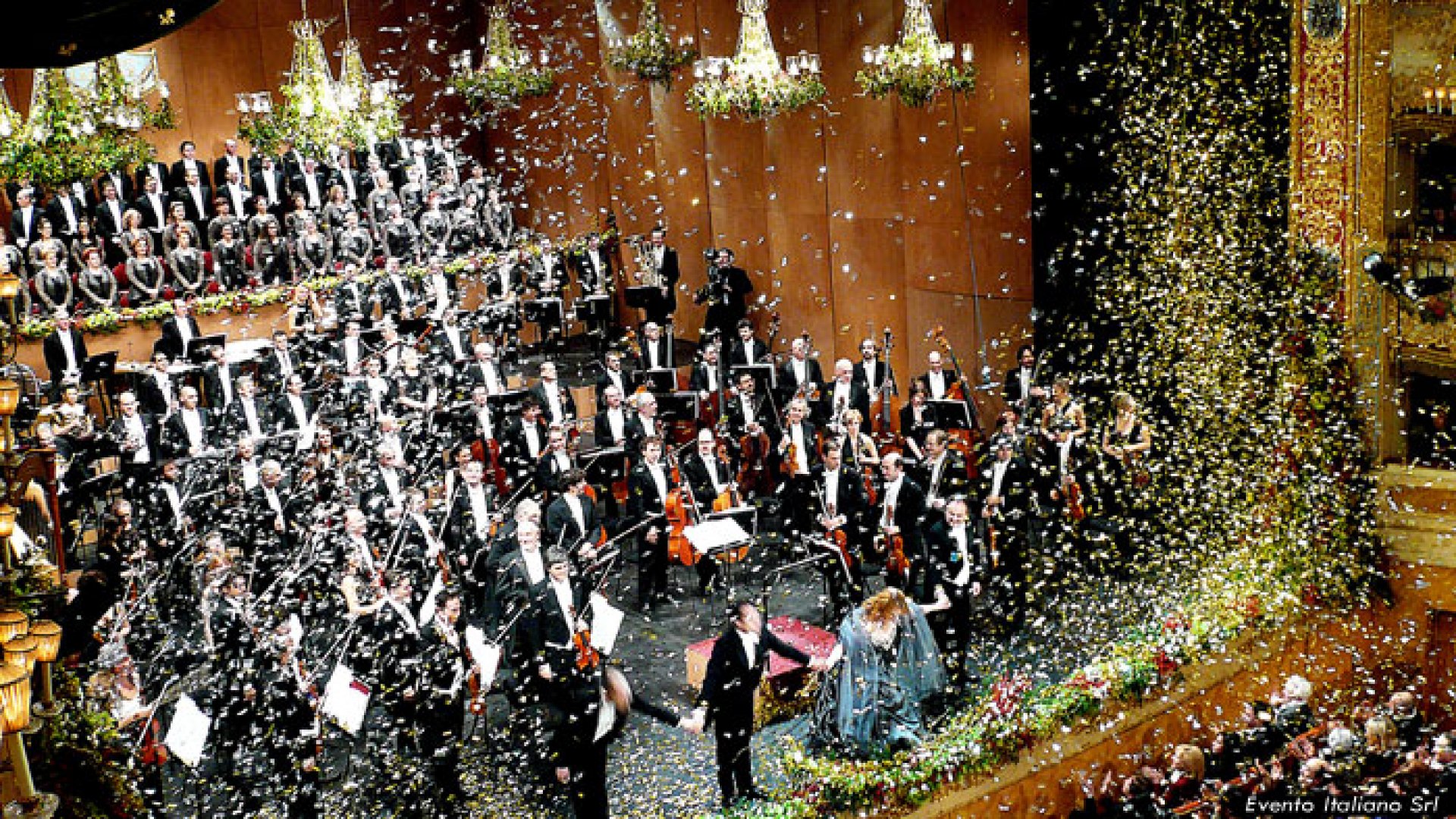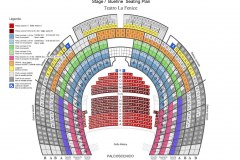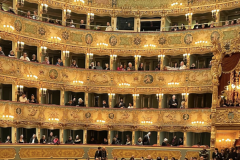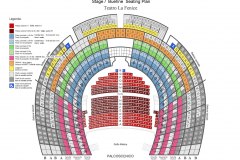Venice New Years Concert at La Fenice Opera Theater Italy
Mo | Tu | We | Th | Fr | Sa | Su |
As is now tradition, the first part of the concert will be purely for orchestra. With soloists and choir, the second part is dedicated to melodrama and will end with what has now become a tradition at the Fenice New Year’s Concerts, with the choir “Va’ Pensiero” from Nabucco and the toast “Libiam ne’ lieti calici” from Traviata by Giuseppe Verdi.
New Year’s Concert 2025/2026
Orchestra and Chorus of the Teatro La Fenice
Conductor: Michele Mariotti
Chorus Master: Alfonso Caiani
Soprano Eleonora Buratto
Tenor Fabio Sartori
For individuals up to 10 tickets, see the booking form above!
AT THE MOMENT IT IS POSSIBLE TO BOOK ONLY THE SEAT/PRICE CATEGORY.
Program and cast
PROGRAMME also LIVE on TV RAI Channels.
Ludwig van Beethoven
Sinfonia n. 5 in do minore op. 67
–
Gioachino Rossini
La gazza ladra: sinfonia
Ruggero Leoncavallo
Pagliacci: «Din, don, suona vespero»
Giacomo Puccini
Tosca: «Recondita armonia»
La bohème: «Donde lieta uscì»
Ermanno Wolf-Ferrari
I quatro rusteghi: intermezzo
Georges Bizet
L’Arlésienne suite n. 2: Farandole
Charles Gounod
Roméo et Juliette: «Je veux vivre dans le rêve»
Giacomo Puccini
Turandot: «Nessun dorma»
Georges Bizet
Carmen suite n. 2: Danse bohème
arrangiamento di Ernest Guiraud
Giuseppe Verdi
Nabucco: «Va, pensiero, su l’ali dorate»
Giacomo Puccini
Turandot: «Padre augusto»
Giuseppe Verdi
La traviata: «Libiam ne’ lieti calici»
Teatro La Fenice
Teatro La Fenice ("The Phoenix") is an opera house in Venice, Italy. It is one of the most famous theatres in Europe, the site of many famous operatic premieres. Its name reflects its role in permitting an opera company to "rise from the ashes" despite losing the use of two theatres (to fire and legal problems respectively). Since opening and being named La Fenice, it has burned and been rebuilt twice more.
The Teatro La Fenice was founded in 1792. In the nineteenth century, the theatre staged the world premieres of numerous operas, including Rossini’sTancredi, Sigismondo and Semiramide, Bellini’s I Capuleti e i Montecchi (The Capulets and the Montagues) and Beatrice di Tenda, Donizetti’sBelisario (Belisarius), Pia de’ Tolomei, and Maria de Rudenz, and Verdi’s Ernani, Attila, Rigoletto, La traviata and Simon Boccanegra.
In the last century, the Fenice has also placed a special emphasis on contemporary productions, welcoming the world premieres of Stravinski’s The Rake’s Progress, Britten’s The Turn of the Screw, Prokofiev’s L’angelo di fuoco (The Fiery Angel), Nono’s Intolleranza (Intolerance) and Maderna’s Hyperion. Recent premieres have included Kagel’s Entführung im Konzertsaal (Kidnapping in the Concert Hall), Guarnieri’s Medea, Mosca’s Signor Goldoni and Ambrosini’s Il killer di parole (The Killer of Words).
With a seating capacity for over one thousand people, the Fenice boasts excellent acoustics (which were improved when the theatre was rebuilt after the devastating fire of 1996), a 98-member orchestra and 66-person opera chorus, a dedicated local audience and a large international following. The theatre is a leading creative venue, staging more than one hundred opera performances per year, a major symphonic season conducted by prominent conductors from across the globe (including frequent collaborations with Myung-Whun Chung, Riccardo Chailly, Jeffrey Tate, Vladimir Temirkanov and Dmitrij Kitajenko), the full cycles of symphonies by Beethoven, Schumann, Brahms and Mahler, a contemporary repertoire focused especially on Venetian artists such as Nono and Maderna, ballets, and chamber music concerts.
The theatre is owned by the Municipality of Venice and managed by the Fondazione Teatro La Fenice, a private body whose members include the State of Italy, the Veneto region, the Municipality of Venice and numerous public and private institutions. The foundation also runs a second theatre, the Teatro Malibran (formerly known as the Teatro di San Giovanni Grisostomo), which dates back to 1678.
The leadership of the Fondazione includes General Manager Cristiano Chiarot, Artistic Director Fortunato Ortombina, Principal Conductor Diego Matheuz and Chorus Master Claudio Marino Moretti.
Transport
Vaporetto
from Tronchetto: line 2
toward Rialto bridge, St Mark and Lido
from Piazzale Roma and the Santa Lucia train station: line 1 or line 2
toward Rialto bridge, St Mark and Lido
stops: take line 1 to Rialto bridge, St Angel, St Samuel or St Mark (Vallaresso);
or take line 2 to Rialto bridge or St Mark (Vallaresso)
Alilaguna public transportation service from the Marco Polo airport - take the orange line to Rialto bridge or the blue line to St Mark (Vallaresso)
Parking: although you can drive to Venice, cars, bicycles and mopeds are not permitted in the city. You can leave your vehicle in one of the parking garages on Tronchetto or in Piazzale Roma:
Entrances
La Fenice Opera House has two entrances:
- the stage door is for theatre staff and performers only and is manned by a doorman;
- the main entrance
Lifts
The boxes, gallery and family circle can be reached via elevators
Access
The theatre complies with all legal regulations regarding special needs accessibility.

 EN
EN DE
DE IT
IT FR
FR ES
ES RU
RU JP
JP RO
RO
 Seating plan
Seating plan 
